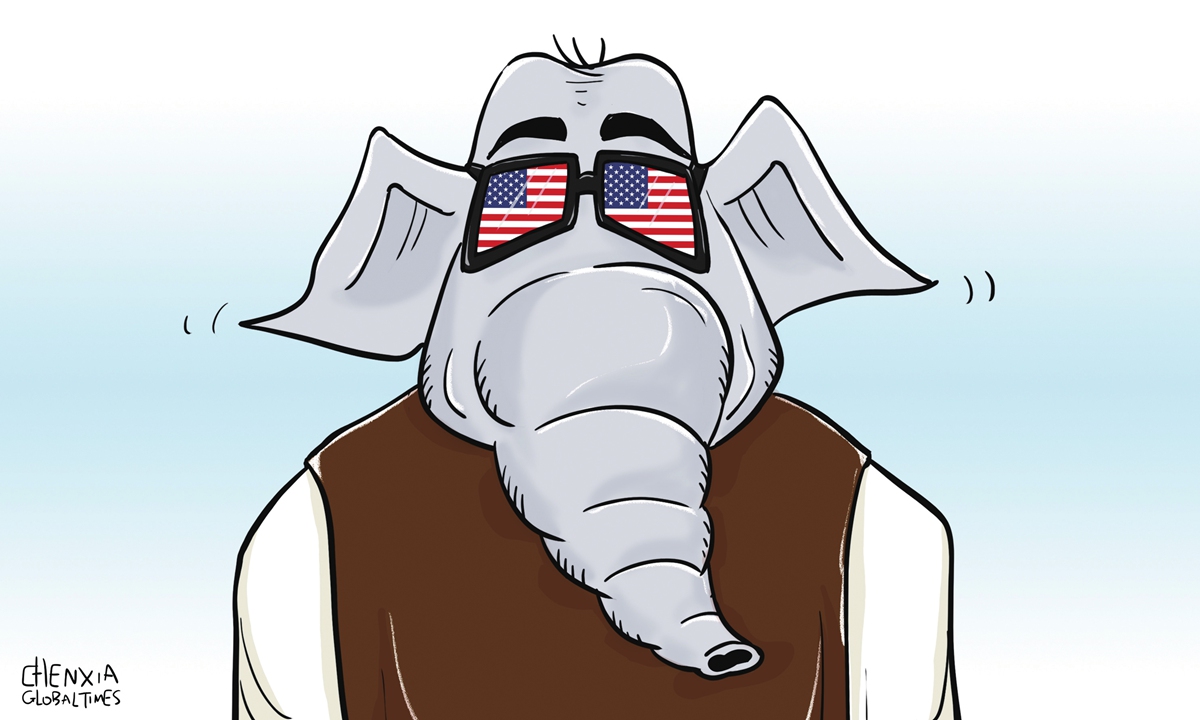By Long Xingchun

According to Indian media reports, the US is in touch with India about using it as a staging post for aerial strikes in Afghanistan, US Secretary of State Antony Blinken told the Senate Committee on Foreign Relations during a hearing on Monday.
Washington's intent to use India as a staging post is not directed at counter-terrorism in Afghanistan. The US war on terror in Afghanistan has ended, making future military operations there less likely. Afghanistan under the Taliban governance is a sovereign country, and its domestic counter-terrorism activities will be mainly carried out by the new government. If the US attacks Afghanistan with air strikes, it will violate the national sovereignty of the country. If Washington really hopes to engage in counter-terrorism activities, Pakistan is the best candidate to serve as a staging post.
After the 9/11 attacks, former US president George W. Bush urged Pakistan to stand with it to counter terrorists. Since Central Asian countries are in Russia's sphere of influence, it is not convenient for the US to travel through Central Asia to reach Afghanistan. On the southwest, Teheran has been hostile toward Washington. Most of the US warfare materials, equipment and personnel had to arrive in Afghanistan via Pakistan. In this context, Pakistan has been the most vital country for the US to strike terrorists in Afghanistan over the past two decades. Pakistan will keep its importance when Washington needs to continue its anti-terrorism attempts in the future.
Even if Washington uses India as a staging base, it will continue contacts and strive for cooperation with Pakistan. Without Islamabad's permission, no aircraft from India or the US can reach Afghanistan.
Actually, the US courtship of India to increase its presence in Afghanistan will jeopardize its operations there. If the US offends Pakistan, the latter will no longer fully coordinate with US' actions in Afghanistan. India's purpose of keeping solid relations with the US-backed Afghan government was to rope in Afghanistan to stand with it in countering Pakistan. As the Taliban has seized power, it will be very difficult for India to improve its relations with the Taliban. This is because India is moving close to the US, and it is hard to make such a unilateral decision. This has put New Delhi into a passive position.
Therefore, using India as a staging post for aerial strikes in Afghanistan is only an excuse. The US wants to attach India closely to it to enhance its presence in South Asia and prepare for any military actions in the Indo-Pacific region, especially the Indian Ocean. The ultimate goal of the US is not Afghanistan; its aim is to target China and divide Asia. Many US strategists, as well as US President Joe Biden, have admitted that the withdrawal from Afghanistan will help the US focus its defenses on other security problems. This includes China and Russia.
India is the most important country in the Indian Ocean region to coordinate with US strategies. India and the US signed the Logistics Exchange Memorandum of Agreement in 2016, which has enhanced military coordination between the two nations as it allows the use of each other's land, air and naval bases for repair and resupply.
US' request to use India as a staging post is within the logistics exchange agreement. India is likely to give a green light. If so, there is more political significance than military substance. It shows that India has decided to align with the US. On the surface, India sticks to its non-alignment principle. But in real practice, New Delhi has formed a quasi-alliance with Washington.
India has its own agendas to pursue. Its attempts to form this quasi-alliance relationship with the US are mainly aimed at dealing with China. The strategic confrontations between China and India will hardly change. With a lack of confidence, India has to rest on the US to contest China. Furthermore, New Delhi hopes Washington will alienate Pakistan.
India will continue to pursue its major power status. Its rhetoric on adhering to non-alignment will not be discarded. New Delhi will not recognize the quasi-alliance relations with the US in diplomacy. It will not sign a treaty of alliance like what Japan, Australia and the UK have done.
Because once such a treaty is signed, the losses will outweigh the gains for India. Given the gap in national strength, under the framework of a US-India alliance, India will merely play the role as a follower. As a result, India's international status and image will be undermined, so will be its diplomatic autonomy and national interests.
The author is a senior research fellow with the Academy of Regional and Global Governance at the Beijing Foreign Studies University and president of the Chengdu Institute of World Affairs.













